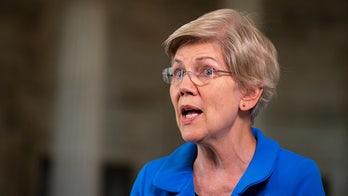MADISON, Wis. – A federal judge on Friday put same-sex marriages in Wisconsin on hold, a week after she struck down the state's same-sex marriage ban as unconstitutional, a move that allowed more than 500 couples to wed over the last eight days.
U.S. District Judge Barbara Crabb's ruling Friday means that gay marriages will end while the appeal from Republican Attorney General J.B. Van Hollen is pending. Couples who were in the middle of the five-day waiting period to get a license, which most counties waived, are caught in limbo.
Van Hollen requested Crabb put her ruling on hold, arguing that allowing the marriages while the underlying case was pending created confusion about the legality of those marriages.
Crabb, who held a 30-minute hearing before issuing her written order, hinted strongly that she was likely to halt further marriages because the U.S. Supreme Court had done that in a similar case out of Utah.
But in her order, she expressed mixed feelings about it.
"After seeing the expressions of joy on the faces of so many newly wedded couples featured in media reports, I find it difficult to impose a stay on the event that is responsible for eliciting that emotion, even if the stay is only temporary," Crabb said in her order. "Same-sex couples have waited many years to receive equal treatment under the law, so it is understandable that they do not want to wait any longer. However, a federal district court is required to follow the guidance provided by the Supreme Court."
The ruling came exactly one week after Crabb ruled the state's ban on gay marriage was unconstitutional. But Crabb didn't issue any orders on how state officials were to implement her decision, and amid the uncertainty, nearly every Wisconsin county — 60 of 72 — issued licenses.
Crabb issued an order preventing clerks from denying same-sex couples marriage licenses, but then put that on hold as well as her earlier ruling striking down the law as unconstitutional.
John Knight, attorney for the American Civil Liberties Union, which challenged the law, called her decision to put her order on hold disappointing.
"But we will fight for a quick resolution on appeal and are confident that marriage will be a reality in Wisconsin very soon for lesbian and gay couples who have waited much too long already," he said in an email.
Van Hollen had no immediate reaction.
As of midday Thursday, 555 same-sex couples had gotten married in the state, based on an Associated Press survey of all 72 counties. There was a rush to get married in Madison and Milwaukee on June 6, when Crabb released her decision, and then again earlier this week throughout the state as other counties began issuing licenses.
Van Hollen said Thursday that same-sex couples with marriage licenses aren't legally married because Crabb hasn't issued an order telling county clerks how to interpret her ruling striking down the law. Van Hollen also said district attorneys could charge clerks who issued licenses with a crime.
Crabb reiterated in Friday's 30-minute hearing that clerks were issuing licenses to same-sex couples on their own.
"I never told them not to and I never told them to do it," Crabb said.
The ACLU and others say because Crabb found the law unconstitutional, and didn't order clerks not to issue licenses, they could legally give them to couples seeking to get married.
Crabb's order did not address whether same-sex marriages completed over the past week are valid.
Wisconsin's constitutional amendment, approved by 59 percent of voters in 2006, outlawed gay marriage or anything substantially similar. The ACLU said the ban violated the constitutional rights of eight gay couples to equal protection and due process and Crabb agreed.
Gay rights activists have won 15 consecutive lower court cases since a landmark Supreme Court ruling last summer, with Wisconsin being the latest.
Wisconsin is among 13 states with gay marriage cases pending before appeals courts. Twelve are with six different federal appeals courts, and one in Arkansas is before a state appeals court. A final ruling on Wisconsin's case likely is months away.
The cases that are furthest along originated in Utah, Oklahoma and Virginia, based on decisions issued in December, January and February. Federal appeals court judges have heard arguments in those cases, and rulings are expected soon.
The U.S. Supreme Court is expected to weigh in during its next session beginning in October.




